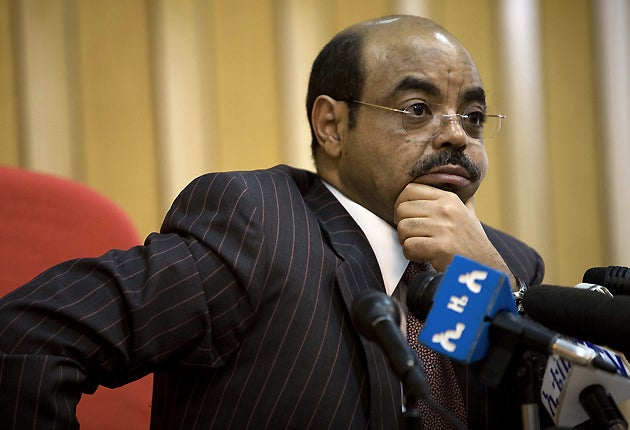Ethiopia's Zenawi aims to become exception

On the surface of it the announcement by the leader of Africa's second most populous nation that he wanted to stand down before the next election ought to be a cause for celebration.
Ethiopian Prime Minister Meles Zenawi said he has "had enough" after 18 years in power and called on the rest of his generation of leaders to follow him through the exit door.
The continent is blighted by leaders who forgot to leave – as the passing of Gabon's Omar Bongo after 42 years in office reminded everyone earlier this month. And Mr Zenawi, the former guerrilla leader who emerged from the armed struggle against the Marxist dictator Mengistu Haile Mariam, had appeared to be following the familiar path from revolutionary to entrenched autocrat.
Once hailed among a bright new generation of "renaissance" African leaders, Mr Zenawi's time in office has become increasingly associated with repression. His fellow renaissance leaders such as Uganda's Yoweri Museveni and Niger’s Mamadou Tandja are busy rewriting constitutions to prolong their stays in office. And the Ethiopian's closest contemporary Isias Afwerki has turned next-door Eritrea into a quasi prison state.
The former medical student has hinted in the past that he would not stand for election again, with polls due next year. However, his most solid statement to date appeared to acknowledge some of the uncomfortable truths facing his Ethiopian People’s Revolutionary Democratic Front EPRDF.
The party is led almost entirely by Mr Zenawi's ethnic group, mainly fellow veterans from the Tigray People's Liberation Front who overthrew Mengistu. The Tigray make up only six percent of Ethiopia's population and without some move to broaden its support the ruling party would likely face an even worse electoral shock than it suffered in 2005. Then a brutal response that included the killing of more than 150 demonstrators and the arrest of thousands of protestors sufficed to hold onto power.
Mr Zenawi appeared to be signalling to his party that a similar approach this time would not be sufficient. He said it was "very likely" a new leader for the EPRDF would not be Tigrayan. "We are not talking about Meles only. We are talking about the old generation. The party needs to have new leadership that does not have the experience of the armed struggle," he told the Financial Times.
The Ethiopian prime minister, however, gave no definitive deadline. Instead his remarks appear to indicate that with democractic space shut down, opposition leaders jailed and foreign NGOs marginalised, some release must be found for the pressure building within his country.
There was precious little encouragement for the opposition , though, as he said there was "zero" chance that leader Birtukan Mideksa would be released to contest the election. The former judge was sent back to prison this year after publically denying that she had asked to be pardoned along with 120 other opposition leaders in 2007. Her supporters insist that she has been jailed because of her mounting popular support.
Subscribe to Independent Premium to bookmark this article
Want to bookmark your favourite articles and stories to read or reference later? Start your Independent Premium subscription today.

Join our commenting forum
Join thought-provoking conversations, follow other Independent readers and see their replies